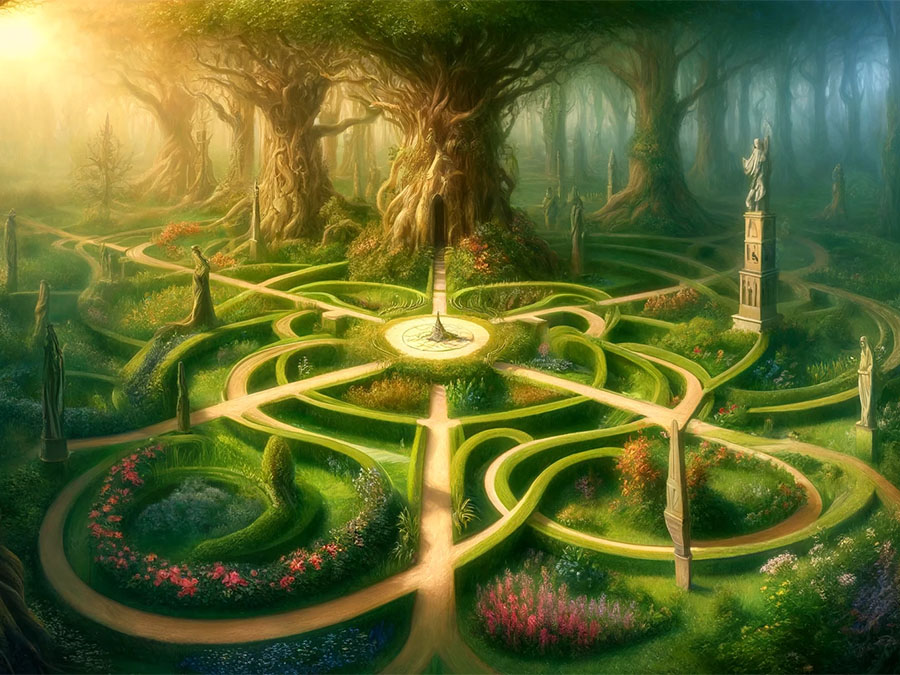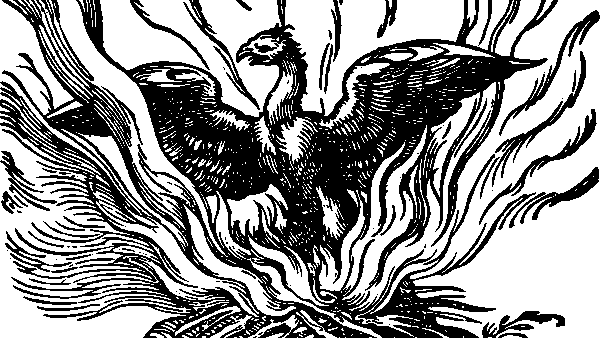A pacy wartime thriller mixes with an abstract meditation on the forking paths of time and fate in a classic short story by Jorge Luis Borges.
A German spy in Britain must communicate crucial information to Berlin, but he has no way of contacting them and is being pursued by the British authorities in the guise of the fearsome Captain Richard Madden, who has already killed his fellow spy Runeberg.
“The Garden of Forking Paths” is something of a wartime thriller, then—quite different from the imagined literature and invented cities of the other stories in the 1941 collection that bears its name. But nothing in the Fictions of Jorge Luis Borges is quite as it seems. The story begins with our narrator, the spy Yu Tsun, hatching a plot, and then narrowly evading Madden by boarding a train that pulls away just as his nemesis arrives panting on the platform.
Things take a turn, however, when Yu Tsun arrives at the house of Stephen Albert, a renowned Sinologist who happens to be the foremost scholar of Yu Tsun’s grandfather Ts’ui Pen, who retired from a position of power and influence to devote thirteen years to writing a novel and creating a labyrinth. But his efforts failed: the labyrinth was never found, and the novel was an incomprehensible jumble.
Albert, however, has solved the riddle left by Ts’ui Pen. The labyrinth and the novel are one and the same. The garden of forking paths is not a physical garden but the confusing world of the novel, and the forks are not forks in space but in time.
“In all fictions, each time a man meets diverse alternatives, he chooses one and eliminates the others; in the work of the virtually impossible-to-disentangle Ts’ui Pen, the character chooses—simultaneously—all of them.”
We are back, for a time at least, in the world of imagined literature, similar to The Approach to Al-Mutasim or the non-existent works of Pierre Menard and Herbert Quain. Albert explains to us how the novel works, with each action branching off into several possible futures, each of which then branches off into several more possible futures, until eventually the novel contains all possible futures and becomes infinite—and incomprehensible.
But then we return to the plot of the thriller. As Madden approaches, Yu Tsun must act. He pulls out his revolver and shoots Albert, who dies instantly.
The following day, our narrator is in gaol awaiting death, but he is triumphant—the newspapers duly reported the murder of the eminent Sinologist Stephen Albert by the stranger Yu Tsun, and his superior officer in Berlin successfully solved the riddle.
He knew that my problem was how to report (over the deafening noise of the war) the name of the city named Albert, and that the only way I could find was murdering a person of that name. He does not know (no one can know) my endless contrition, and my weariness.
The Germans bomb the Allied position at Albert and successfully delay the planned offensive, although Borges tells us in his introduction that the delay was only for two days and “entailed no great consequences, as it turns out.”
So what to make of all this? “The Garden of Forking Paths” is a very implausible story told in a strange mishmash of styles, and yet it’s one of my favourites in this collection. I think that’s because of everything it communicates about the workings of time and fate.
The huge implausibility comes in the fact that Yu Tsun picks his victim out of the phone book, and the random man with the surname “Albert” just happens to be an academic who has solved the riddle of his grandfather’s work.
Yet there are signs in the story that this is no mere coincidence. When Yu Tsun steps off the train at the nearby Ashgrove station, he does not ask for directions: he is given directions by some boys on the platform who somehow already know or at least assume that he is going to Stephen Albert’s house. The directions involve turning left repeatedly, a common strategy for navigating a labyrinth, and we are told that the road “dropped and forked as it cut through the now-formless meadows.”
When he arrives unannounced at Albert’s door, the man seems to be expecting him. Albert addresses him in his own language and asks, “You will no doubt wish to see the garden?”
It seems clear that Yu Tsun is in the labyrinth. Perhaps we all are. We take the forking paths and arrive at only one of our infinite possible futures. As Albert says presciently to Yu Tsun:
“Time forks, perpetually, into countless futures. In one of them, I am your enemy.”
This post is part of my Borges Marathon, a slow perusal of the Collected Fictions of Jorge Luis Borges. Let me know your thoughts in the comments, and if you’d like to join me for some or all of it by posting your own reviews, let me know and we’ll coordinate our blogging schedules.




There are 10 comments
Oh this one sounds delicious!
It is one of my favourites! It’s a good story to follow purely on a narrative level, and then the layers of meaning add a richness that’s very satisfying.
Thanks for your in-depth analysis.
I posted a fe thoughts here:
https://wordsandpeace.com/2021/12/23/ficciones-by-jorge-luis-borges-the-garden-of-forking-paths/
Thanks Emma, I’ll check it out!
Wow, this is so intriguing. You lay out the structure of the story beautifully, and I can see how the forks in the road weave into the preoccupations with time and chance. To lower the tone somewhat, I keep thinking of a Sonic the Hedgehog book my son had as a child, in which the reader kept making choices and decisions that took him or her to a different page and a new choice, creating a unique pathway through the story. The book contained all the possibilities, but the reader allowed the forks in the tale to take him through a small fraction of them. I’m not sure if that’s analogous in any way to Borges! I’m also intrigued by the borrowing from the spy genre. Every time I read one of your posts I think that I MUST pick up Borges… I’ll get there eventually!
Oh yes, I remember those “Choose Your Own Adventure” books I had as a child! I can definitely see the analogy, and I don’t think you’re lowering the tone at all—one of the things I like about Borges is that as erudite as his writing can be, he also loves to make literature out of all sorts of other forms like detective stories and spy thrillers. So if Sonic the Hedgehog had been around in 1940s Buenos Aires, I think he’d have made a beautiful literary “fiction” out of it 🙂
This playing with time is endlessly satisfying. Do you feel like you’ve gotten back into a rhythm with your project again? It seems like there’s a new story regularly, every now and again, and you’re obviously still enjoying them.
Yes, I’m definitely back in a monthly rhythm—for now, at least! We’re doing much less travelling now and spending more time in quiet rural Serbia, so I’m settling back into a writing and blogging rhythm, and definitely still enjoying the Borges Marathon. Thanks for stopping by to cheer me on 🙂
Borges would’ve hated your use of a.i
Although I generally don’t like assuming what figures from the past would have thought about today’s technologies, I think you’re probably right. I experimented with using an AI image generator to create the featured images on a few of these posts, but have gone back to using stock images now.